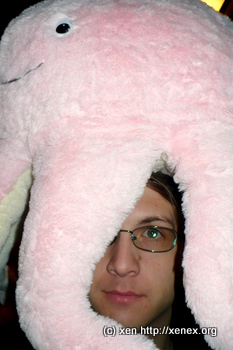
Across the Universe ««« 2010 »»» Preemptive Homesickness
01.11.10
11:01 a.m. -Thomas Carlyle
The beginning of all wisdom is to look fixedly on clothes, or even with armed eyesight, till they become transparent.
Recycling Party

| |
| I think we can all agree that this would not be a good look for me now. |
I scour my closets for fodder for the biannual Recycling Party, where we try to pawn off those articles of clothing and appliance that we may have outgrown, but which have life in them. My mistake may be in asking Melanie for her input, as she has certain hesitations about my wardrobe.
"Oh god, the bird shirt," she immediately gasps, referring to a somewhat stiff green shirt with a white bird embroidered below the breast.
"Already in the pile."
"You're so good. And anything made of velour. The nineties are over."
"I don't think that velour was the fabric of the nineties. That might have been flannel. Anyway, I'm not really aware of fashion." I add, a touch self-deprecating, "I'm not sure if you've noticed."
I have never really had a sense of sartorial finesse. I wear what feels comfortable, both physically and emotionally. My closet encompasses several primordial identities that I've shrugged off, blazers next to bondage shirts next to hoodies.
Part of my style has been a reaction to those I was dating at the time, under the creative reasoning that I might as well match my girlfriend if I weren't going to have a set style of my own. This meant winnowing away previous articles in new relationships. Emily once accomplished this expertly and accidentally during a move, when she left a bottle of bleach in our dirty laundry hamper, destroying a quarter of both our wardrobes, several shirts for which I still find myself searching.
Melanie dresses in t-shirts or tank tops and jeans, with sneakers. Occasionally, she will throw a sweater or jacket on, as seasonally appropriate. She spent her adolescence in school uniforms, likely for the best given how little she then liked her body. This easygoing ensemble will evolve toward something else in time, though I cannot imagine what it will be beyond comfortable.
Jacki, the Recycling Party's hostess, has always had an excellent and largely sense of style, which suggests to me an inward confidence. She had a clear idea of the woman she would be since she was a tiny gothling, but also knew that safety pins needed to evolve toward elegance and professionalism. Her identify, as demonstrated by what she wears, is a clear evolution that has (like the noble shark) reach a plateau of perfection years ago and will not need to shift further.
Melissa used to be so changeable in her teen years that my mother, who quite liked her, could hardly recognize her from visit to visit. Work changed her wardrobe, guiding her toward outfits that suited her better. But when the day was done and it was up to her to pick an outfit, she resigned to the comfort.
Both Hannah and Daniel found styles they liked and, as far as I could tell, filled their dressers with a dozen exact copies (hers: blue jeans and a black t-shirt, his: slacks, vest, button up shirt, and shoes-all black-and a dark red tie). Daniel once explained that the point of this was to set a fixed, ageless image of him in people's minds. I pointed out that him make him like a cartoon. Hannah now wears a Naval uniform most of the time, Uncle Sam acting as her fashion consultant.

| |
| Nor this. |
Clothes are unfortunately a big part of how the world perceives us, the costume for daily interaction. It is telling that Melanie's constant first action upon entering my apartment is to doff her clothes, even when nothing more dramatic than having dinner or talking follows (meaning that I have to warn her if I have guests so she won't tear her shirt off before the front door closes). She never needed to maintain the pretense of clothes with me, so she doesn't. Even millimeters of cloth are artifice too much, especially when she has spent the week maintaining this fašade.
I have grown more accustomed to my teacher drag (pants, a button up shirt or sweater, a blazer), understanding not only the necessity, but that I actually look rather dapper in clothes that fit. I wear them only because it makes my life easier, it provides me the visual signals of authority that cause the students to unconsciously respect me. I feel like an animal camouflaged in poisonous colors. I know, too, that the clothing I wore as a teenager provided signals to the world, ones that were both beneficial to my social standing and detrimental to the esteem of anyone even a year older than me. Even now, Melanie assumes that none of my clothing will fit me, so attached was I once to overlarge clothes.
The solution is not to conform, certainly, but to be aware of the signals one is sending and own them. Does what you wear match who you are? Impossible, but it does inform people at a distance who you might be. People are lazy as a rule and won't put forth any more effort in getting to form an opinion of you than they have to.
We can't fall into the fallacy of believing that our fashion represents who we are, of course. For far too long, I was too attached to my long hair as a representation for who I was, mistaking the symbol for the fact. One day, when I got too tired of being disrespected while working, I finally deigned to have it shorn, liking immensely more how I looked with shorter hair. I do not know how many times I was not granted opportunities because I adhered more to the trappings of previous identities, though I can guess. I don't have to accede to people's prejudices, but it was foolish to pretend I was ignorant.

| |
| But head octopuses are always chic. |
I daily see students who are bristling against or will soon confront the same conflict. Are they their music? Their hair? Their clothes? And yet, if you take these things away, who are they? Can they exist without these attachments? Of course, but it takes bravery to discover this for themselves and no one (certainly not me) can do this for them. Young men and women sacrifice mobility and dignity, wearing their pants literally inches from their knees, revealing their underwear to the world. They swear they do this because that is what convicts have to do. As my father works in the prison system and I have interviewed there, I know for a fact that every effort is made to be certain a prisoner's clothing fits (baggy clothing could hide weapons). They are willing to waddle and hike their jeans up every few steps to affirm their loyalty to a caste, even though thugs would be far better served by the ability to run without tripping and splitting open their chins.
Similarly, there was a moment as a teenager when an alternative song came over the bus radio and I pronounced that it sucked (and it did, it was Matchbox 20). My friend, also in the same musically segregated clique, started chewing me out for daring to offer an opinion outside what a company had declared. To his way of thinking, it was impossible to be in our caste and not like something that a record executive marketed as "alternative rock". My tastes have further drifted and it is rare, today, when I can turn on the radio and like what is on (even when they are playing the music I liked in middle school and high school). My identity hasn't changed radically, but I see no reason to subject myself to anything that isn't going to entertain me so I can keep a label adhered.
The Recycling Party is thus some part exchanging one's trapping for another's. It is releasing what one once considered critical, considered part of one, for something new.
Jacki shows me some of her old clothing to give to the absent Melanie, and I reject most of it out of hand, some with a sense of regret. The clothing is pretty and would suit Melanie well, save that she would refuse to wear it. Jacki then shows me women's suits inherited from her mother and asks if there is any chance Melanie would wear them. I can imagine neither the Melanie I know, nor any future incarnation, accepting any of these as parts of her wardrobe. A benefit to being a scientist is that people allow for a relaxed dress code.
"Is it weird that I want my girlfriend to look like my best friend?" I ask Jacki.
"A little," she says.
Only a few of my shirts find new homes, the others promised to Salvation Army. I acquire a couple of sweaters and mailing envelopes, happier to be rid of things than for what I have gained.
Soon in Xenology: Maybe a job, Melanie getting her butt back here.
last watched: Arrested Development
reading: Ender in Exile
listening: Fiona Apple
Across the Universe ««« 2010 »»» Preemptive Homesickness
Thomm Quackenbush is an author and teacher in the Hudson Valley. He has published four novels in his Night's Dream series (We Shadows, Danse Macabre, Artificial Gods, and Flies to Wanton Boys). He has sold jewelry in Victorian England, confused children as a mad scientist, filed away more books than anyone has ever read, and tried to inspire the learning disabled and gifted. He is capable of crossing one eye, raising one eyebrow, and once accidentally groped a ghost. When not writing, he can be found biking, hiking the Adirondacks, grazing on snacks at art openings, and keeping a straight face when listening to people tell him they are in touch with 164 species of interstellar beings. He likes when you comment.